As an Amazon Associate I earn from qualifying purchases.
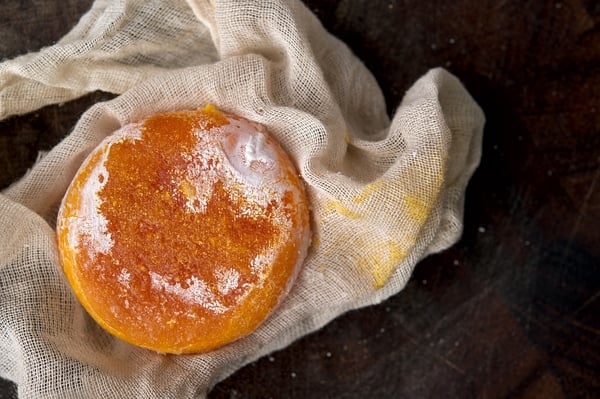
Egg yolks are one of the most magical of foods. Chefs all over the world wax poetic about them, but it’s hard to understand why when all you might be exposed to are the wan, watery, factory-farmed yolks you see in most supermarkets. A golden treasure they are not.
You can only understand the joy — lust, even — over an egg when you finally see (and taste) a real egg, eggs from chickens raised on grass and bugs and whatever else it is that a hen loves to nibble throughout the day.
Before I’d encountered such eggs, when I saw pictures of Italian egg pasta, I thought they were retouched: Their pasta is always bright yellow. As much as I tried, I found it impossible to duplicate with eggs from the supermarket. I talked to Italian pasta makers and they said you need yolks of a truly golden, almost orange, hue. That’s what gives you that pretty color.
I came into possession of such eggs from my friend Teala’s father, who raises ducks and geese in my neighborhood. It’s what I prefer to use for my pasta, and, just like the Italian pasta pictures I swooned over, the photos on this post are not retouched. This is precisely how yellow they actually are.
Not too long ago, Teala’s dad gave me two goose eggs along with the duck eggs. I was amazed at their size. I cracked one open and made an entire batch of pasta with that one egg. I was shocked at how orange the yolk was — brighter even than the duck eggs.
I wanted to capture that color, that richness. I’d known about salt cured egg yolk for a few years; my friends, Chefs Brad Cecchi and Oliver Ridgeway at Grange in downtown Sacramento had first clued me into it. Basically you bury egg yolks in salt, then dry them out until they are like a very hard cheese. This is exactly how you use them — as a golden, eggy, über rich substitute for grated cheese over pasta or rice.
Brad and Oliver never explained to me exactly how to do this, but fortunately Chef Jeffrey Weiss does in his remarkable book Charcutería: The Soul of Spain. You will be seeing a lot of this book in the months to come. I am mildly obsessed with it and have already made a half-dozen or so of its recipes, ranging from salami to sausages to cured fish and now, here, salt cured egg yolks.
If you’ve never cured anything in your life, this would be a good place to start. It’s really easy and comes together in about 2 weeks. And once you’ve made the cured yolks, you can use them over pasta for months.
What else can you do with cured egg yolk? Not sure. I eat a lot of pasta. What would you suggest?
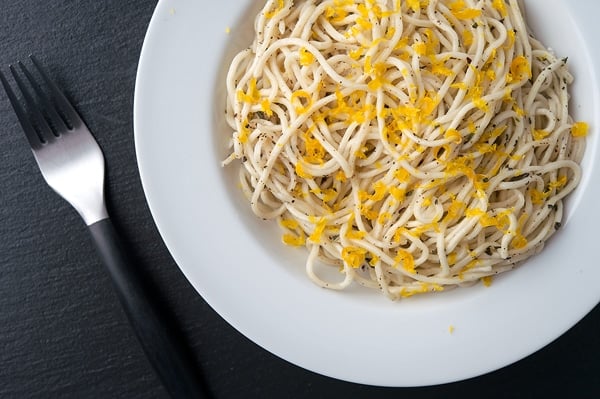
Grate your egg yolks over any of these pasta recipes.
Salt Cured Egg Yolk
Ingredients
- Egg yolks
- Salt
- Cheesecloth
Instructions
- Get yourself two containers: One for the whites, so you can do something with them later, and one to cure the yolks. You will need to lay down a half-inch layer of kosher salt in the bottom of your curing container; you can go a little deeper if you want. Make little depressions in the salt to hold the egg yolks.
- Crack the eggs and separate them. Gently lay the yolk in one of the depressions and repeat until you have all your eggs in the container. Now bury them in more salt.
- Keep the yolks buried in the salt for a week in the refrigerator. Take them out -- the yolks will be firm and a little tacky still -- and carefully brush off the salt. You might need to remove the salt with a damp paper towel.
- Wrap the yolks loosely in cheesecloth and hang them in the fridge until they are dry, about 7 to 14 days. Store in the cheesecloth in a closed container in the fridge.
Notes
Nutrition information is automatically calculated, so should only be used as an approximation.
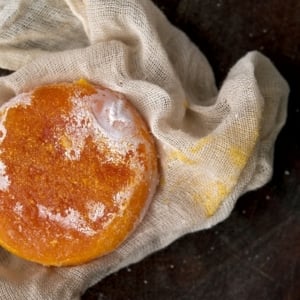
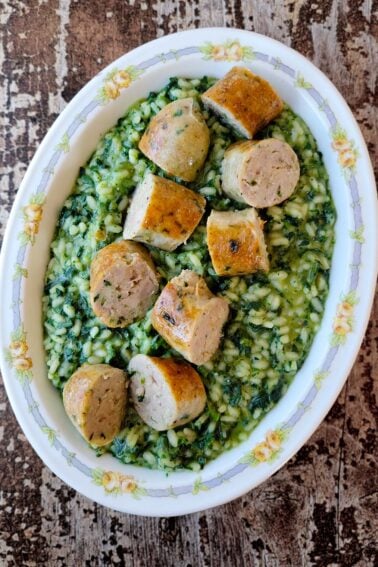
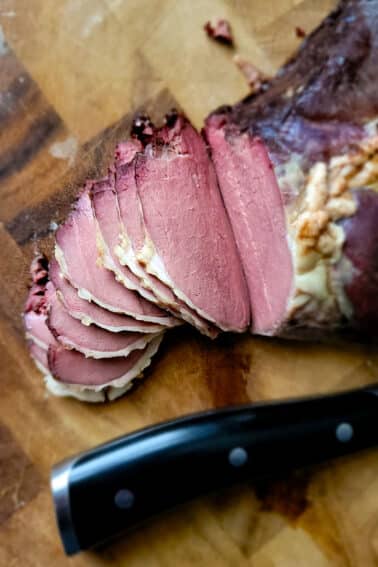
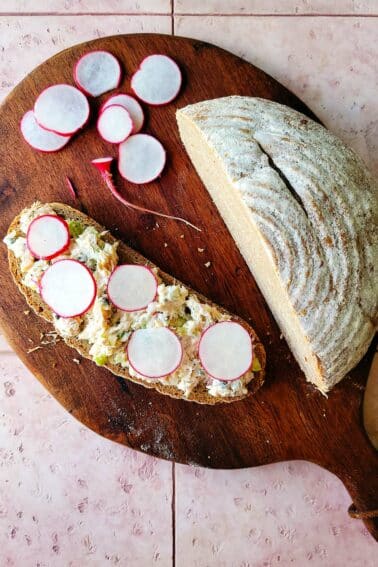
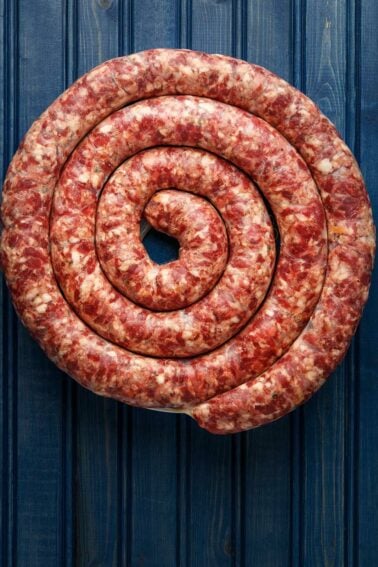
I was wondering if the yolks keep their valuable Vitamin E content.
Lynn: I don’t know, but I don’t see why not. Salt doesn’t normally destroy vitamins.
Hi Hank, could I take these on a late-season backcountry hunt? Or even on a hunt during warmer September months? I was thinking on a multi-day trip. Do you think these would go bad? Seems like a perfect high fat snack.
Max: I think they’d be pretty stable once fully cured and dried.
I’m very curious if the herbs affected the flavor. I’m also wondering if you have compared the flavor of the slow oven dried eggs to the more quickly finished in the oven? I have assumed that the slower method would allow more flavor to develop. Thanks
Hi, Could I keep them in the salt for longer, say for 1 month?
Only one way to find out…
Yup. I made some and just stored them buried in salt, they were in my refrigerator for over 6 months and stayed perfectly fresh. Mind you I did have them in a very well sealed Rubbermaid tub buried in salt.:-) just made a new batch tonight the hardest part is waiting for them to be done
If the yolk leaks a minimum is it still ok? Tried one and it’s firming up overnight, but a little yolk did leak out. Just checking
My girls don’t eat salad without this.
Old Post but thanks for the info. I’m working on some RnD for the restaurant. Marinated the yolks the same way you would make soy eggs but raw. Currently on day 6 of curing. Gonna try half regular and half a with tea smoke finish. Information makes the culinary world a better place!
Cure for 2 hours at room temp. Then dehydrate them at 90 degrees for several hours to a day. You will have them in a day instead of weeks. Please don’t ask if this is safe. A remedial understanding of food science answers this.
I have some curing in shoyu koji, salt and sugar. Ready tomorrow
For my first attempt, I added 2 drops of liquid smoke, and 2 drops kefir water. I’ll report the results in a few days.
I’m trying the recipe a little different. I’m drying hard boiled egg yolks in salt… we’ll see…
Your recipe for preserving egg yolks uses only salt. I have seen other recipes on line that use an equal amount of sugar as well. What’s the difference? Can the salt include flavorings such as chopped fresh herbs or garlic?
Rod: The sugar also removes moisture, but leaves the yolk slightly sweet, which I don’t like. And I have never tried adding herbs.
Hank: I’ll try it and let you know how it goes.
After you’re done with one batch, can you reuse the salt on another?
Kristofer: I would guess so.
Have you ever dried them in the oven? I’m just curious. Most of the recipes I just found dry them that way.
Brenda: No, I haven’t. I prefer the slow dry in the fridge.
Quick question: when you say wrap the yolks loosely in cheesecloth, I assume they can all be put together and not wrapped separately? Sorry if it’s a silly question, just want to be sure:)
Pam: They need to be separated at least until they are no longer sticky.
This is a perfect way to keep some of the flavor of your abundance of eggs if you keep backyard chickens and allow them to stop laying in the winter. It adds so much rich flavor to a dish. You can turn anything into a popping recipe by shaving some of this on top.
Are you sure the cured yolks can keep indefinitely in the fridge? I would think there’s a expiration/freshness period for them.
David: Yes, I am sure. They are heavily salted. I’ve used them more than a year later and they were fine, like and old pecorino cheese.
I just made these and added some dried spices to the salt mixture. Instead of hanging the yolks after the salt cure, I dried them in the dehydrator for about 3 hours at 140 degrees. You can also heat your oven to its lowest temperature, turn the oven off, place the eggs on a rack and let them sit overnight. These are fantastic grated over vegetables and salads as well as pasta.